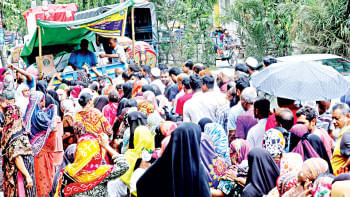The petition
"I am a father of two martyred freedom fighters. My two sons died in 1971," said the man, aged 60, smiling. He lost two sons in the war but still he could laugh. "My name is Abdul Jalil."
We meet Jalil Saheb at a time when the country is under HM Ershad's dictatorship. It is 1988. Jalil Saheber Petition is a story by none other than Humayun Ahmed and came out in a book titled, Sheet O Onyanno Golpo (Winter and Other Stories).
Jalil Saheb's petition! What kind of petition was that?
His petition said something that many were not willing to say at the time. It said: more than a million Jews were killed during World War II. Everyone guilty of this heinous crime was prosecuted. But why were those responsible for the killing over three million people in Bangladesh never brought to justice? Mr Jalil asked the government to take action in this regard.
 Remember it was a time when hardly anybody used to mention the need for a war crimes trial. We had to wait till 1992 for the Gono Adalat, a symbolic court to try Ghulam Azam, to be formed under the leadership of Jahanara Imam, mother of martyred guerrilla Rumi.
Remember it was a time when hardly anybody used to mention the need for a war crimes trial. We had to wait till 1992 for the Gono Adalat, a symbolic court to try Ghulam Azam, to be formed under the leadership of Jahanara Imam, mother of martyred guerrilla Rumi.
The word “razakar” was almost absent from the media as if nobody had ever collaborated with the Pakistan occupation army in 1971. Our politicians were in “forgive and forget” mode. (It was again Humayun Ahmed who coined the phrase “tui razakar” through a parrot in his famous tv serial Bahubrihi in 1988-89. And around the same time the band group Nova released a song in which they demanded a list of collaborators.)
So, Jalil Saheb -- like Humayun Ahmed, who himself is the son of a Liberation War martyr, Jahanara Imam and Nova -- was doing what many others should have been doing. Why?
"I am not doing this because I lost two sons. My boys were killed in the war. I seek no retribution for their death. I demand justice for those who were dragged out of their homes and killed." It was nothing personal.
Jalil Saheb was bound by oath. So was Shaheed Janani Jahanara Imam. "I was there, at the dawn of the movement. Our oath was not to leave the streets until the goal was achieved," reads her last letter.
Jahanara Imam, the one to initiate the movement for the trial of war criminals, had written the open letter, to the people of Bangladesh, on her deathbed. She died of cancer on June 26, 1994, at the age of 65. Already, the government had sued her on the charge of sedition.
And what did Jalil Saheb say?
"Do you think I will give up? Never. Two of my sons went down fighting. I will fight, too, until I die. If necessary, I will collect the signatures of each and every one in Bangladesh. Three million people lost their lives. How is it possible to remain silent? Are we human beings, or what?
"…I will put each and every swine in the dock.” However, as the story says, Jalil Saheb did not see the start of the war crimes trial in his lifetime.
Neither did Jahanara Imam. But she wanted us, the people, to continue the battle.
(Acknowledgement: Hasan Ferdous for his English translation of Jalil Saheber Petition)

 For all latest news, follow The Daily Star's Google News channel.
For all latest news, follow The Daily Star's Google News channel. 



Comments